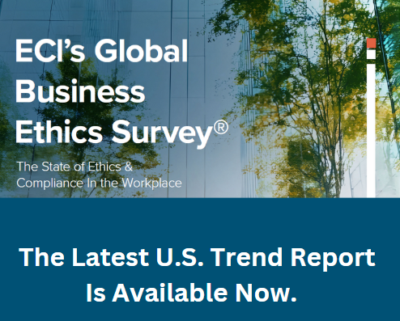ECI Announces Publication of the Global Business Ethics Survey® U.S. Trends Report on the State of Ethics & Compliance in the Workplace
- When employees perceive a weak ethical culture in their organization, they are four times more likely to feel pressure to compromise standards than employees who perceive a strong ethical culture.
- The report finds that ethical culture strength, which drives positive ethics outcomes at organizations, has declined over the past decade.
- Compared with 2020, employees are less likely to observe misconduct, feel pressure to compromise ethical standards, and experience perceived retaliation. Yet when employees do observe misconduct, they are less likely to report it.
- On-the-road employees are significantly more likely to feel pressure to compromise standards compared with remote and on-site employees. They are also far more likely to experience retaliation after reporting observed misconduct.
MERRIFIELD, VIRGINIA, January 9, 2025—The Ethics & Compliance Initiative (ECI) today announced publication of the Global Business Ethics Survey® (GBES®) U.S. Trends Report on the State of Ethics & Compliance in the Workplace. The report shows that while most individual ethics outcomes improved since the previous survey in 2020, strong ethical culture is declining in U.S. workplaces, and reporting of observed misconduct is down.
Conducted by ECI since 1994, the Global Business Ethics Survey is a rigorous, multi-country longitudinal study of ethical trends in public and privately held companies. ECI’s team of expert researchers measures ethical practices in 42 countries and five regions, making GBES the largest study of its kind.
Based on survey findings, the new report details United States trends in ethics & compliance programs and ethics culture by tracking key outcomes of pressure, observed misconduct, reporting of misconduct, and retaliation.
Dr. Patricia Harned, CEO of Ethics & Compliance Initiative (ECI), noted, “ECI’s Global Business Ethics Survey is referenced from boardrooms to classrooms and is a benchmark for many ethics & compliance (E&C) professionals.” Dr. Harned added “This GBES U.S. Trends Report was made possible through the generous support of Deloitte*.”
Lori Pressler, Chief Ethics Officer, Deloitte LLP, said, “Promotion of ethical leadership is foundational to any organization’s success—as well as its culture. Deloitte is honored to sponsor the U.S. report of ECl’s Global Business Ethics Survey, delivering critical insights that empower organizations to place integrity first.”
The Global Business Ethics Survey U.S. Trends Report on the State of Ethics & Compliance in the Workplace uses data1 to generate insights into employees’ perceptions and experiences about ethics in the workplace over the past 10 years in the United States. More than 2,800 employees responded to the survey, representing a diverse mix of gender, age, and work environments that include remote workers, on-site workers, and “on-the-road” workers at client locations or changing worksites.
The report details several notable findings:
- Key finding 1: Most ethics outcomes have improved since 2020. In 2023, 17% of employees reported feeling pressure to compromise their ethical standards, down from 29% in 2020. Observed misconduct (46%) and perceived retaliation (49%) are also down from 2020.
- Key finding 2: Reporting rates have declined. In 2023, only 64% of those who observed misconduct reported it. That represents a decline from 71% in 2020 and 75% in 2017.
- Key finding 3: Ethical culture strength—a critical driver of ethics outcomes—has declined since 2013. ECI’s research has consistently shown that a strong ethical culture decreases pressure on employees to compromise standards and reduces observed misconduct. In 2023, a smaller percentage of employees (56%) reported positive perceptions of their organization’s culture than at any point in the past 10 years.
- Key finding 4: On-the-road employees are at heightened risk. These workers are much more likely to feel pressure to compromise standards, observe misconduct, and experience retaliation after reporting misconduct than remote workers or those working in company offices.
- Key finding 5: Culture matters regardless of work location. Conversely, remote workers report the lowest instances of pressure, observed misconduct, and retaliation. The data suggests that a physical office is not necessarily central to a strong ethical culture.
The report highlights that a strong ethical culture continues to be a critical factor in reducing both pressure to compromise standards and the rate of observed misconduct. Both elements can create unneeded risk and liability, along with a negative impact on the bottom line for organizations. The findings show that in weak ethical cultures, employees are four times more likely to feel pressure to compromise standards than employees in strong ethical cultures.
See details in the full GBES U.S. Trends Report.
About the Ethics & Compliance Initiative (ECI)
ECI empowers organizations to build and sustain the programs that are proven to increase integrity in organizations. We help leaders create strong ethical workplace cultures and successful businesses that do the right thing.
For more information about ECI and becoming a member, visit www.ethics.org.
*Please see www.deloitte.com/us/about for a detailed description of their legal structure.
- This report discusses data collected from employees working in the United States at publicly and privately held, for-profit companies during 2013, 2017, 2020, and 2023. Unless noted, data are from 2023. See Methodology section in the full report for more information.

